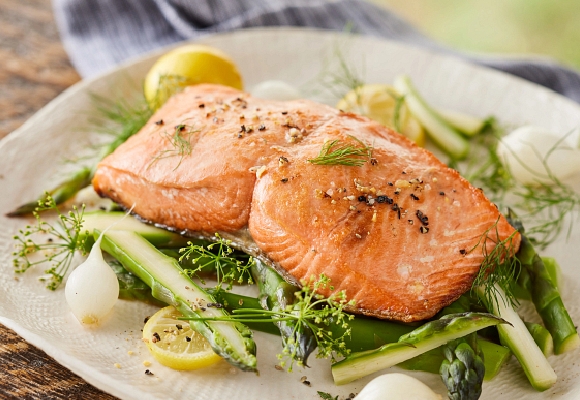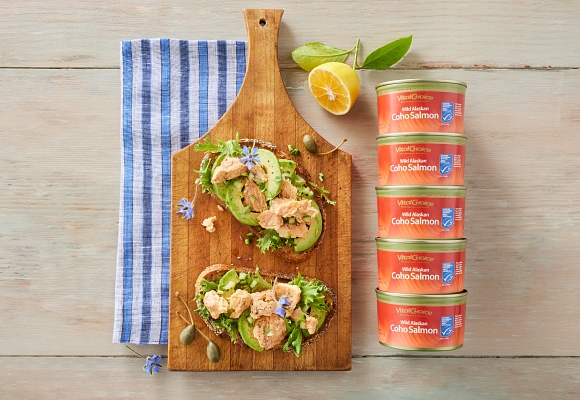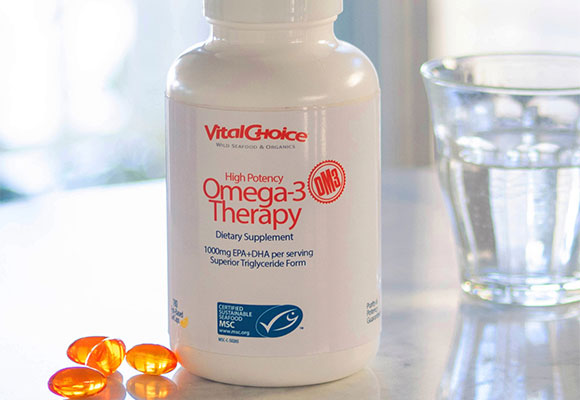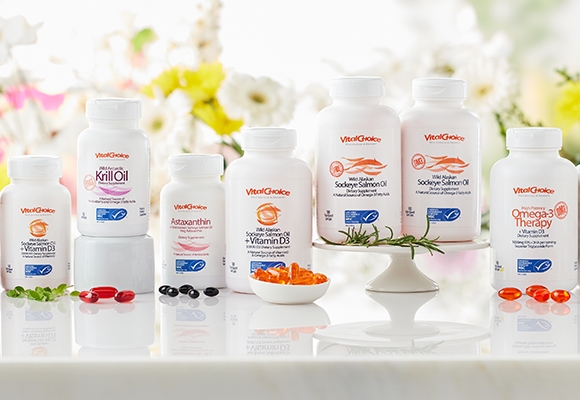Don't have an account?
Click Here- Fast, secure checkout
- Exclusive promotions & offers
- Health Benefits of Fish
Health Benefits of Fish
Fresh from the cool sea to restore body and mind nature's healer comes
— haiku poem by newsletter reader Ginny Eash
Omega-3s and Human Health
Fish and other seafood are the only significant sources of the most benefical omega-3 fatty acids, called DHA and EPA.
And the richest sources of omega-3 DHA and EPA are fatty fish like wild Salmon, Tuna, Sardines, and Sablefish.
The results of countless studies indicate that these vital food factors promote optimal health.
Our bodies must convert the omega-3 in plant foods (called ALA) into the forms found in our cells and in seafood, called DHA and EPA.
This means that the omega-3 ALA in plant foods is not as beneficial as the omega-3 DHA and EPA in seafood.
Visit our Omega-3 Facts & Sources page to learn more about the various omega-3s, their roles in the body, and the daily intakes recommended by U.S. and global health authorities.
The global medical consensus is that adults should consume 250mg to 500mg of seafood-source omega-3s (DHA and EPA) daily.
These two charts* present the average amounts of omega-3s and other nutrients is various seafood species:
- Selected species sold by Vital Choice
- USDA nutrition data for Alaskan seafood species
*Nutrient data for wild seafood are averages, because the amounts vary by harvest region and year. Our chart draws on several data sources, so the numbers do not always not match the USDA numbers, or the Nutrition Facts for our products, which are derived from lab tests on our specific products.
American Heart Association (AHA) stance on omega-3s
The AHA position is that the ways in which omega-3s reduce the risk of cardiovascular disease are still being studied, and that research shows that omega-3s have the following effects:
- Decrease the risk of arrhythmias, which can lead to sudden death.
- Decrease triglyceride (blood fat) levels.
- Decrease growth rate of atherosclerotic (arterial) plaque.
- Lower blood pressure modestly.
In addition, omega-3s are shown to improve the ratio of HDL ("good") cholesterol to total cholesterol, and this ratio is the most accurate predictor of cardiovascular risks.
The AHA makes these recommendations:
- People without documented coronary heart disease: Enjoy two servings of fish per week.
- Patients with diagnosed coronary heart disease: Consume 1,000 mg (1 gm) of omega-3s daily, preferably from fatty fish or fish oil supplements.
- Patients who need to lower triglycerides: Take 2 to 4 gm of omega-3s daily.
- Patients taking more than 3 gm of omega-3s per day from fish oil capsules should do so only under a physician's guidance.
Please note: Persons diagnosed with heart disease especially those using implanted cardiac defibrillators or taking blood thinning drugs should consult a physician before taking supplemental omega-3s or any other dietary supplement.
America's "omega imbalance" hurts health
The health benefits of dietary omega-3s are blunted when diets are high in the omega-6 fatty acids that dominate most vegetable oils (corn, safflower, soy, canola, cottonseed) and the packaged and restaurant foods that contain them.
Instead, use oils low in omega-6 fats, such as extra virgin olive oil, macadamia nut oil, coconut oil, and special "hi-oleic" sunflower oil.
To learn more about this critical health issue, see the sidebar at right, titled "America's Sickening 'Omega Imbalance'".
Other Beneficial Nutrients in Fish
Fish are also the richest food sources of three other valuable food factors:
- Vitamin D offers uniquely strong bone-building and anti-cancer benefits. Tuna and wild salmon are the richest food sources known; click here to see the vitamin D content of various fish species For more information on this overlooked nutrient, go to our newsletter archive, see Articles by Topic in the right hand column, and click on the topics listed under Vitamin D.
- Astaxanthin is the powerfully anti-inflammatory, carotenoid-class antioxidant that gives wild Salmon its characteristic red-orange color.
- Selenium is an essential mineral needed to make enzymes that play key roles in the body's internal antioxidant network.
Safety Issues: Fish Rewards Clearly Outweigh Risks
The subject of fish safety is plagued by exaggeration, imbalance, and distortion.
We sell only exceptionally pure wild seafood that's naturally low in mercury and manmade pollutants. (For more on this, visit our Purity page.)
But the preponderance of published research suggests very strongly that the well-documented developmental and preventive rewards of fish-rich diets outweigh the minuscule, hypothetical risks to adult, child, or fetal health.
Notable Quotes
Here's what some experts say about the importance of diet and omega-3 fatty acids to your health:
"Foods rich in omega-3 fatty acids can stop arrhythmia before it triggers sudden death from heart attacks. That makes fish such as salmon as potentially potent as any high tech heart drug and considerably cheaper to stock up on." — Alexander Leaf, M.D. (deceased), Professor Emeritus, Harvard University
"Omega-3 fatty acids have so many biological roles because they are a primary element of health for virtually every cell and organ system in the body. Along with their partners, the omega-6 fatty acids, they keep our bodies in balance, modulating such basic physiological functions as inflammation, cell signaling, blood pressure, immune response, and the electrical excitability of heart and brain cells." — Professor Andrew Stoll, M.D., Harvard Medical School
"My anti-aging patients often start out eating fish two to three times a week. When they see how quickly their skin improves, they are quick to increase their intake to five to seven fish meals a week." — Nicholas Perricone, M.D., author of "The Wrinkle Cure, The Perricone Prescription, The Acne Cure"
NOTE: The statements on this website have not been evaluated by the U.S. Food and Drug Administration, and are not intended to treat, cure, or prevent any disease.
Information on this site is provided for informational purposes. Consult a health care professional in regard to the personal use of any health-related products, especially if you have any existing medical condition.
- Health Benefits of Fish













![Discover Delicious Alaskan Halibut,[object Object]](https://images.contentstack.io/v3/assets/blta522552136812831/blte345e2c533fbe13d/6607210f1da7d28e19af4fe0/240304-VC-TopNav-WhiteFish-Halibut-fc.jpg?auto=webp)







.jpg?auto=webp)






.png?auto=webp)